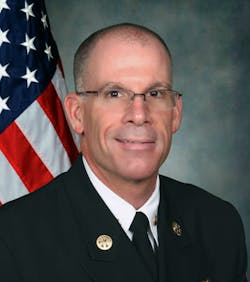For as long as I can remember, firefighters around the country, multiple generations in fact, have been debating the superiority of smooth bore versus fog nozzles. Assertions of reach, penetration, friction loss, steam conversion and knockdown are just a few of the common defenses or justifications shared by one side or the other. From a differing viewpoint, one could argue that the smooth bore represents the “old school” way of thinking—a relic of years past—while the combination nozzle (fog, automatic, low pressure, etc.) represents the progressive, modern era of firefighting.
While I will respectfully refrain from adding fuel to this unceasing, oftentimes incestuous debate, the concept of “going old school” is one well deserving of further discussion.
The phrase “going old school” as it is commonly applied may be interpreted by some to mean that an individual is a traditionalist, that they’re stuck in the mud, or resistant to change. In actuality, “going old school” can be defined as anything that is from an earlier era—something even looked upon with high regard or respect. For the fire service, this could be a certain tactic, a mindset or methodology, a standard practice, a type of uniform or attire, to name a few examples.
Going old school is about recognizing something of years past and acknowledging its importance in the modern day. In many cases, it’s these old school practices and principles that develop our organizational culture, our values and our beliefs.
The fire service is in a constant state of change, while simultaneously trying to uphold and maintain the founding traditions of its past. The question becomes, where do we draw the line when it comes to our modern day practices and principles?
In the business world, the goal is often to follow popular trends in the hopes of striking a chord with consumers in order to sell a product or service. The American fire service is not in a business where our operations (the end product via a service delivery model) can be driven or directed by a trend, what’s popular or what makes us feel good. We are public servants. We provide a service to our customers that can’t in any way be compromised or influenced by an individual or group’s self-serving interests, perceived or otherwise. The customer MUST win every time.
As a firefighter, fire officer or fire chief, I challenge you to look around and identify what’s “old school” within your organization, and ask yourself why that “old school” tactic, mindset, product—whatever it may be—is respected, cherished and maintained? Do these old school items, beliefs or practices in any way compromise the safety and effectiveness of your operations? If so, should they be allowed to continue to be practiced, worn or utilized?
Consider these facts: The fire service today is no longer a profession populated by a singular sex. Our most prominent service is no longer fire suppression but rather EMS and behavioral health. Unremitting hazards of years past have long been replaced—and in some cases amplified—by advancing technologies. The boundaries and characteristics of our responses are ever evolving, and the once-cherished image of a firefighter is constantly being challenged and scrutinized by a population too frequently motivated by litigation and opportunity.
The pride and prestige that motivate us to serve as firefighters and to carry on the proud tradition of public service should not be propelled by the tangible symbols that represent the means and methods by which we serve, but rather should be propelled by the individuals and the selfless actions through which they serve.
Recognizing and honoring our traditions and methodologies, “going old school” is and always will be an important factor in our growth and development as a profession. Our traditions and beliefs create the foundation of our existence, setting the standards by which we operate and progress. But when our traditions hinder our forward progress, become individualistic, self-serving and unwelcoming to others, or compromise the safety and operational effectiveness of the services we provide, they must be relegated to the annals of history or the walls of a museum.
Let us never lose sight of the importance of those “old school” tactics or practices, but let us also never lose sight of their purpose in defining our roles as selfless, humble public servants.
About the Author

Timothy E. Sendelbach
Editor-in-Chief
Timothy E. Sendelbach is a 30-year student and educator of the fire and emergency services, and former editor-in-chief for Firehouse. He has served as an assistant fire chief with the North Las Vegas, NV, Fire Department, as the chief of training for Savannah (GA) Fire & Emergency Services and as assistant fire chief for Missouri City, TX, Fire & Rescue Services. He is a credentialed Chief Fire Officer and Chief Training Officer and has earned a master’s degree in leadership from Bellevue University, bachelor’s degrees in fire administration and arson and an associate’s degree in emergency medical care from Eastern Kentucky University.
